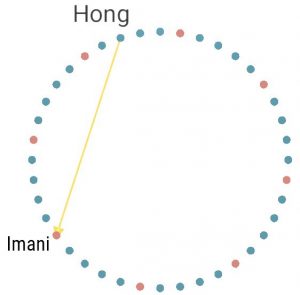Effects of Allyship
Allyship is a popular concept, whose definition can vary. We define allyship as taking action to support those who might otherwise be or feel excluded.
Reactive Allyship
Often when thinking about allyship, we think about reactive allyship – reacting to bias when we see it.
This can look like:
- Confronting disrespectful, gender-biased comments
- Addressing inappropriate gender-related jokes
- Calling out implicit stereotyping (e.g., a coworker assuming a woman wouldn’t be interested in a position that requires technical expertise)
- Questioning lack of women candidates on a job shortlist
In our simulator, we demonstrate this by using a yellow arrow.
| Imagine Ben says a gender-biased comment to Imani, but Hong steps in to confront Ben. This action would look like this.
|
 |
Note!
Another key assumption of our simulator is that all allyship actions are effective (which is not always true in reality)
To be successful, allyship needs to recognized as supportive by those the action is intended to support (for more information see De Souza et al, forthcoming)
Intended allyship does not always result in experienced allyship.
Try It Out
In the simulator, you’ll see an allied behavior slider added to the control panel. Change the percentage of allied behavior & see what happens to the inclusion level.
What would happen if 15% of Ada’s coworkers took reactive allyship actions? 30%?

Overall:
Reactive allyship actions can be effective in reducing the effects of bias in the company:
- When allyship actions are taken & positively experienced by minority group members, the overall impact of bias is reduced
- Members of the advantaged group can be very persuasive and influential as allies***
But, keep in mind that confronting bias directly is not always the most successful tactic; people who confront bias can be seen as over-reactive* or complainers**.
*Czopp & Monteith, 2003; Rasinski & Czopp, 2010
**Kaiser & Miller, 2001, 2003
***Rasinski & Czopp, 2010
So if reactive actions like confrontations are not always successful, what other options do Ada and her colleagues have?
A Moment with Ada
[Image of Ada] “It was great to hear Hong calling out that comment Ben made, but Imani is still considering leaving because she is not being invited onto the most technical projects our company is working on, even though she has years of experience…”
 Follow
Follow